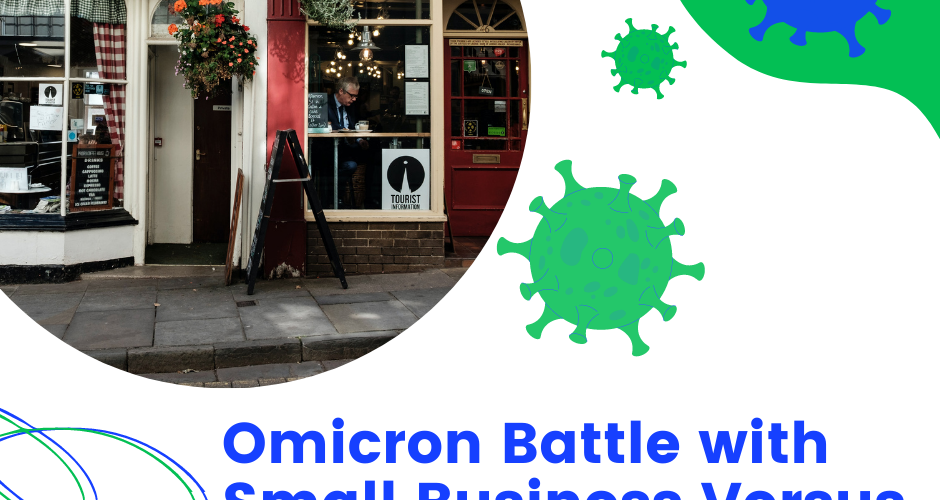Since the pandemic’s start, enterprises have immersed hit after the strike. They’ve
had to cope with forced closures during lockdowns, Covid-related ability
constraints, enraged consumers, and personnel shortages.
Businesses are faced with a catastrophic labor shortage as the omicron form
spreads and Covid instances resurface. Previous waves of the COVID pandemic
have shown that when COVID cases grow, movement restrictions are
implemented, affecting economic activity, they added.
Some firms have been forced to temporarily close because they do not have
enough workers to keep open, while others are over-scheduling staff for shifts in
case someone becomes ill and is unable to come in.
According to the paper, Omicron cases are spreading more quickly in India, with
the new type accounting for almost 60% of all infections. Small and large
businesses are also affected.
Big firms have thrived in some aspects simply because they can provide clients
with everything they want, at a lower price and faster than the competitors.
Entrepreneurs were hit hard by the virus’s strain, as well as supply-chain
disruptions and inflation, with female and minority business owners bearing the
brunt of the damage.
Table of Contents
Addressing Innovation in Small Businesses
According to the Organization for Economic Cooperation and Development
(OECD), innovation is defined as the introduction of a new or significantly
improved product or the implementation of a new process, commercial operations,
workplace organization, external interactions, marketing approach, or
organizational method is used.
Small low investment business articles are viewed as key growth operators in the economy and the
ever-changing economic environment; their benefits are displayed in flexibility,
fast response, adaptability to market changes, and quick decision-making.
Despite the challenges, small businesses face in stimulating innovation, a
significant portion of small businesses in business areas are actively involved in
multiple types of technologies, although many of these innovations are not new.
Adapting To The Current Crisis Is A Difficulty For Small Businesses
Small businesses going online is one of the biggest trends to emerge during the
COVID-19 pandemic, and it opens up new opportunities to solve a variety of
problems. Indeed, the internet has proven to be a lifeline for many small
enterprises, allowing them to stay afloat during the epidemic.
Even when firms stay open, people face financial hardships as a result of lost jobs
or fewer hours worked. It’s crucial to remember that when a business fails or needs
to lay off employees, it impacts entire communities of people who rely on job
income to sustain themselves and, in turn, support other companies and
organizations in the area.
Market Niche Differences
Another distinction between small and large firms is that small businesses tend to
focus on a particular market, whereas larger enterprises tend to offer a wider range
of products and services to a wider range of customers.
Selling a specific product or service in a very particular market may be enough to
keep a small company with only a few employees afloat. Companies prefer to
expand into new areas and provide new goods and services as they grow to
generate revenue and recruit more staff.
Personality And Ability To Adapt
Employees in both large and small latest business blog ideas are lost during a pandemic. It’s a
long-standing problem that when a firm grows larger, it appears less human. Some
businesses may lose the competitive edge that helped them flourish when the
charm and zeal that previously made an SME outstanding is replaced by corporate
systems.
Because they don’t have to answer to a board of directors or several regional heads,
small businesses are more equipped to think outside the box and act on the spur of
the moment.
Base Of Customers
Large corporations have the resources, finances, and people to meet the needs of
their customers. This enables them to retain consumers. Even if a small firm has
the potential, it lacks the financial and human resources to meet the needs of its
customers. This leads to a loss in the customer base.
Disruptive Ability
Disrupting the established standards is the ambition of any small firm. Consider
how much has changed in food distribution since the last epidemic. Because there
aren’t dozens of higher-ups to satisfy, a small firm may defy expectations and
produce something that larger corporations can’t.
Legal Framework Of A Company
The legal form of a company dictates how it is run, taxed, and whether or not its
owners are responsible for its obligations. Many small businesses begin as sole
proprietorships or partnerships, giving a single owner or a group of owners entire
authority. Business profit is taxed on the personal income tax returns of sole
proprietors and partnerships. They’re also accountable for commercial debts under
the law.
Large firms frequently pay taxes separately from their owners. Most small
enterprises do not have reporting obligations, such as SEC filings. Shareholders
vote to choose executive board members, but they do not operate the company
directly.
More advantages
Whether it’s glass ceilings, corporate jargon, or compartmentalized thinking, a
huge company is generally big on bureaucracy. A small firm must function in a
flexible manner that frequently benefits from a flat hierarchy, which translates to
perks such as casual clothes, a relaxed work atmosphere, and other perks. It has
been shown that these work-life perks are far more appealing to young people than
pay alone.
Conclusion
Omicron has posed a serious financial burden to millions of small and large
enterprises alike. It has the potential to endanger many more people, especially
those who are less resilient. Businesses and governments that assist them may help
them stay in business and place them on a more sustainable, robust foundation,
allowing them to continue to anchor communities by supporting local economies.
Larger companies are more likely to have the finances, commercial and legal
structure, and size to develop measures to satisfy social distancing rules for
operating and reopening during a pandemic than small businesses.
We conclude this business blog by, whether it is small or large companies all they
need is an adaptive nature and ability for being creative to sustain any situation like
pandemic or epidemic
Tagged in:
american business news, best business blogs 2022, business blog, current business related news, entrepreneur, latest business blog ideas, latest usa business blogs, low investment business articles, russia versus nato america, startup business strategy usa, ukraine russia crisis



